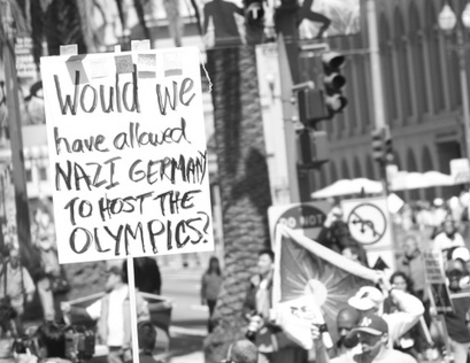Not sure how to break the news to this person...
— StuffJournalistsLike (@JournalistsLike) February 10, 2014
There are so many weird things about this that is worth an entire post.
1. Context is important.
http://www.theatlantic.com/daily-dish/archive/2008/04/er/217723/
From a pro-Tibet rally in San Francisco
- The Atlantic, circa Apr 2008
The internet is such a fast moving place that images, quotes and even videos, can be lifted, copied, taken out of context, reappropriated, malappropriated, recycled and mashed without any regard for the original context that they came from.
I'm guessing that when the Twitter user StuffJournalistsLike found the picture, they thought that it fit in well with the current protests surrounding the Winter Olympics in Sochi in Russia. This photo presumably came from a pro-Tibet rally in San Francisco in 2008; actually protesting against the Beijing Summer Olympics.
2. Would we have allowed Nazi Germany to host the Olympics?
Maybe the person who made the placard was fully aware that the 1936 Summer Olympics were held in Berlin. What if this is a case of emphasis not being conveyed on the sign? Suppose it's saying that "we" wouldn't have allowed Nazi Germany to host the Olympics but "you", that is the people in charge, did.
What if this protester is questioning why nothing was done to stop China from hosting the Olympics and is trying to hold them accountable? If "we" could have done something, then why didn't "you" on our behalf?
3. Who did allow Nazi Germany to host the Olympics anyway?
Now there's a question.
http://www.aldaver.com/votes.html
The IOC met in Barcelona on 26th April 1931 to decide where the Games of the XI Olympiad were to be held. In 1931, Germany was still in the period known as the Weimar Republic. Hitler was appointed Chancellor in January 1933 and the enabling act was two months later. All of this happened not quite two years after the IOC had met in Barcelona.
Arguably the entity which hosted the Olympics in 1936 was a very very different place than the one which had been awarded the games in 1931. How pray tell would the IOC had have known that? I have even read that the IOC had had private meetings to try and strip the games from Germany but that assurances were given that Jewish athletes from both Israel and the United States would be left alone.
So what to make of all of this?
I think that it was graphic designer Frederick R. Barnard when speaking about the effectiveness of pictures in advertising, who said that "a picture paints a thousand words". The problem is when those thousand words are confused, garbled and vague. It's even worse when one person reads a completely different set of thousand words into a picture than the next person.
In response to StuffJournalistsLike's comment "Not sure how to break the news to this person"? What news? Do they need to break news to you? And, how do you break the news to someone four years in the past?


No comments:
Post a Comment